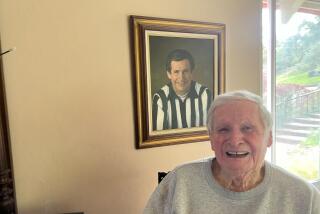Heavy Stuff : Only Three Boxers Have Regained Heavyweight Title in Second-Fight Rematch Against Their Conquerors
- Share via
Evander Holyfield sees it as a chance to put an exclamation point on his first-fight victory.
“I want to give Mike an opportunity to let him know it wasn’t a fluke, that I can do it again,” the heavyweight champ said of his rematch with Mike Tyson next Saturday in Las Vegas. “Everyone can have a bad day and that shouldn’t stop them from getting an opportunity.”
A fluke? A bad day? The answers to those questions are what sell rematches, especially rematches with the heavyweight championship at stake.
Only three fighters have become heavyweight champs again in second fights with their conquerors--Holyfield against Riddick Bowe in 1993, Muhammad Ali against Leon Spinks in 1978 and Floyd Patterson against Ingemar Johansson in 1960.
Patterson’s victory, making him the first man to regain the title, and Ali’s win, making him the first three-time champion, were historic. But they don’t compare in anticipation and drama with Jack Dempsey’s failure to regain the title against Gene Tunney in the “Battle of the Long Count” in 1927.
Rivaling the Dempsey-Tunney fight in boxing legend is the Joe Louis-Max Schmeling rematch, which reached beyond boxing because Schmeling was German and Adolph Hitler’s monstrous shadow was beginning to stretch across Europe.
Schmeling was a former champion and Louis was marching toward a title shot when they had met June 19, 1936, at Yankee Stadium. Schmeling knocked out Louis in the 12th round.
It was Louis, however, who got a title shot, and he became champion by knocking out Jim Braddock in 1937.
Louis defended his title three times and then met Schmeling.
“The black man will always be afraid of me. He’s inferior,” Schmeling was quoted as saying by Joseph Goebbel’s Nazi propaganda machine, Richard Bak wrote in the 1996 biography, “Joe Louis: The Great Black Hope.”
Joe’s wife, Marva, said in the book: “Everywhere we’d go before the fight, all we heard was, ‘We want you to get Schmeling.’ It seemed his whole life hinged on that one fight.”
A crowd of more than 70,000 crammed Yankee Stadium on the night of June 22, 1938, and millions of people listened on radios.
When it was over, people celebrated in Detroit’s Paradise Valley under a banner proclaiming: “Joe Louis knocked out Hitler.”
Louis pinned Schmeling on the ropes with a first-round barrage that included a right to the ribs that the German later claimed was an illegal kidney punch. Referee Arthur Donovan gave Schmeling a two-count, obviously ruling a knockdown because the ropes were holding him up. Louis then knocked Schmeling down three times and the fight was over in 124 seconds.
Referee Arthur Donovan didn’t complete the 10-count after the final knockdown, and New York sports writer Stanley Woodward wrote, “He was beaten. He might have got up, but he would have been killed.”
Louis would hold the heavyweight title until he retired in 1949 after 25 defenses.
As for Dempsey, he had been champion since 1919 when, fighting for the first time in three years, he lost the title on a 10-round decision to Tunney before 135,000 people in the rain at Sesquicentennial Stadium in Philadelphia on Sept. 23, 1926.
The rematch took place before more than 100,000 fans in Sept. 22, 1927, in Chicago.
“His refusal to observe the boxing rules of Illinois State Athletic Commission, or his ignorance of the rules, or both, cost Jack Dempsey the chance to regain the world’s heavyweight championship here tonight in the ring at Soldier Field,” is how James P. Dawson began his account of the fight in The New York Times.
The rule called for a fighter scoring a knockdown to go to the farthest neutral corner.
Dempsey, trailing after six rounds, landed a four-punch combination, ending with a left hook that knocked Tunney down. Dempsey, however, stood as close to Tunney as he could, as he was used to doing, and referee Dave Barry refused to start counting until Dempsey went to a neutral corner.
“By the time Barry returned from escorting Dempsey, four seconds had lapsed; in fact, the timekeeper, Paul Beeler, was calling out ‘five’ in order to give Barry a count to pick up,” Randy Roberts wrote in his 1979 book, “Jack Dempsey: The Manassa Mauler.”
But because the referee was not supposed to start a count until Dempsey went to a neutral corner, Barry correctly began his count at one. Tunney got up at nine and the arguments began--and continue--about whether Tunney could have gotten up sooner.
Tunney knocked down Dempsey in the eighth round and won a 10-round decision.
Patterson’s victory over Johansson on June 20, 1960, was one of most dramatic turnarounds in heavyweight championship history.
“When I hit him square with my right, the referee can count to a thousand,” Johansson said before the rematch.
The Swede had won the title by knocking down Patterson seven times and stopping him in the third round on June 26, 1959, at Yankee Stadium.
In the rematch at the Polo Grounds, Patterson made history by knocking out Johansson with a left hook in the fifth round.
More to Read
Go beyond the scoreboard
Get the latest on L.A.'s teams in the daily Sports Report newsletter.
You may occasionally receive promotional content from the Los Angeles Times.










